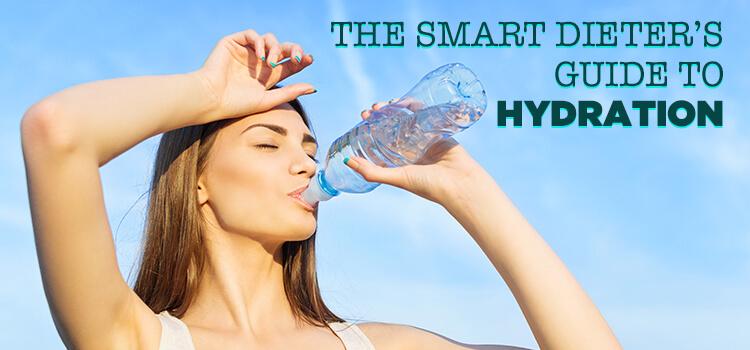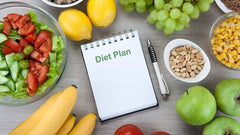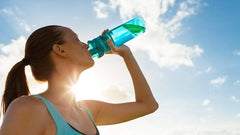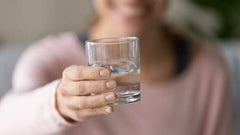
Benefits of Proper Hydration - The Smart Dieter’s Guide
Your body needs water to survive. Literally every cell, tissue, and organ needs water to work properly. And, if you’ve been paying attention to recent news and reports, you’ll know that water can also support weight loss efforts.
In short, hydration is vital not only for your dieting efforts, but for general well-being too. In this article, we’re going to explain why hydration is important (both for weight loss and otherwise), how your body loses water, how much water you should be drinking, and the best sources of hydration (other than water, of course).
Benefits of Proper Hydration
Hydration is at the core of our health. The human body is approximately 60 percent water. The brain and heart are both about 73 percent water, the lungs are about 83 percent water, the skin is 64 percent water, and even bones, unexpectedly, are 31 percent water. And since so much of the body is water, hydration matters.
Why, you ask? There are many reasons to consider:
- Water regulates body temperature through both respiration and sweating.
- Water metabolizes and transports carbohydrates and proteins in the bloodstream.
- Water flushes out waste, primarily through urination.
- Water absorbs shock for vital body structures such as the brain, spinal cord, and, in pregnant women, their unborn babies.
- Water regulates heart rate and blood pressure.
- Water is essential for maintaining a healthy metabolism.
- Water forms saliva.
- Water lubricates joints.
The connection between hydration and weight loss is less obvious, but it is still the subject of numerous investigations. Many believe the feeling of fullness in the stomach after drinking water allows people to consume fewer calories yet still feel satisfied. Other studies reveal mixed results for connecting weight loss and water depending upon how hydration was measured.
Regardless, hydration matters.

YOUR BODY LOSES WATER THROUGHOUT THE DAY…
When you go to the bathroom, sweat, or even just sit and breathe, your body is losing water. If you’re at the gym exercising, have a fever, or are ill, you may lose water even quicker. Therefore, it’s important that you remain hydrated at all times.
But what happens if you aren’t hydrated properly? There are many common signs of dehydration you should be aware of to ensure you always increase water consumption before it becomes a problem:
- Very little urine production, or urine that is darker than usual
- Dry mouth
- Sleepiness or feelings of fatigue
- Extreme thirst
- Headache
- Confusion
- Feelings of dizziness or light-headedness
Typically, if you already feel thirsty, you’re dehydrated. In which case, it’s best if you make a mindful effort to drink water throughout the day, even if you don’t feel like you need to.
There are also some people who are at a greater risk of dehydration than others. This includes those who:
- Are pregnant or breastfeeding
- Are outside during hot weather
- Are exercising
- Have a fever or are ill with a condition like vomiting or diarrhea
- Are trying to lose weight
- Have a medical condition, such as kidney stones or a bladder infection
BENCHMARKS FOR WATER CONSUMPTION: HOW MUCH SHOULD YOU DRINK?
The tried and true rule of eight, 8-ounce glasses per day has no scientific basis. The best rule of thumb is to drink enough to make you go to the bathroom every two to four hours. However, you’ll get water from more than just fluids; it’s in food as well.
It’s important to note that while there is no scientifically proven basis for the most common recommendation, there’s no harm in it either. In fact, if you can drink eight, 8-ounce glasses of water per day, you should. Doing so will keep you hydrated and prevent the symptoms and complications of dehydration mentioned above.
Related article: How to Drink More Water: 3 Essential Roles Water Plays in Your Diet >>

STAYING HYDRATED: GREAT SOURCES OF WATER IN FOOD
As you can imagine, you’ll get water from more than just drinks. In fact, you’ll get a lot of water from food, especially fruits and vegetables.
There are many options you can reach for when you want to stay hydrated:
- Cucumber
- Lettuce
- Zucchini
- Cantaloupe
- Watermelon
- Pears
- Pineapple
- Carrots
- Apples
- Strawberries, along with other berries
- Spinach
- Grapes
- Tomatoes
There are countless other examples but clearly, incorporating fresh produce in your diet is vital for hydration. Indeed, you may get up to 20 percent of your daily water requirement from fruits and vegetables.
This is yet another way that hydration supports your healthy lifestyle efforts. And so, with hydration in mind, you should feel encouraged to reach for fresh fruits and vegetables rather than processed goods.
However, you should also know that there is a notable amount of water in some store-bought foods such as applesauce and even some yogurts. So remember, fresh produce isn’t the only way to sneak additional water into your diet!
STAY HYDRATED TO REMAIN ON TRACK WITH YOUR WEIGHT LOSS AND JOURNEY TO BETTER HEALTH!
While it’s true that there is no proven science between hydration and weight loss, there’s still a correlation between feeling full and consuming fewer calories. As such, it’s vital that you continue to focus on hydration as part of your general efforts to become a healthier version of yourself.
In addition to water, comprehensive supplements such as PhenQ, can help you feel fuller for longer. In fact, PhenQ works as an appetite suppressant, so when combined with adequate water consumption, you can keep cravings at bay more effectively and stay on track to meet your goals.
Don’t forget, proper hydration is important not only when you’re at the gym or in the heat, but at any time of the day. Every part of your body needs water, and as a smart dieter, it’s vital that you deliver. When you do, you’ll feel and look your best.
Most importantly, you’ll always have the energy and ability to push harder in the gym and take control in the kitchen, making a well-rounded, healthy lifestyle part of your everyday routine.




